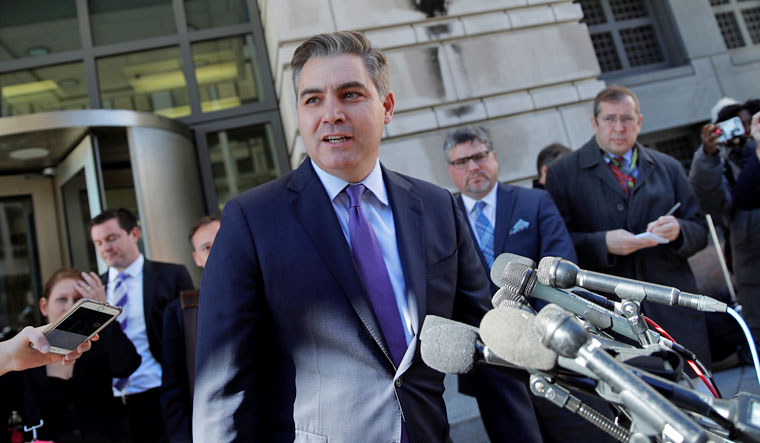A federal judge on Friday ordered the White House to reinstate the press credentials of CNN reporter Jim Acosta, whose pass was revoked after a heated exchange with President Donald Trump.
Judge Timothy Kelly issued a temporary restraining order that requires the White House to restore Acosta's access until a full hearing is held, according to the network.
CNN and other media groups, including Trump favorite Fox News, backed the lawsuit, which claimed that revoking Acosta's pass violated constitutional guarantees of a free press.
Kelly, a Trump appointee to the bench, said that his ruling was based on "due process" for the journalist, and that he would hold additional proceedings on the constitutional issues at stake, including the First Amendment free press guarantee.
"I want to be very clear that I have not determined that the First Amendment was violated," he said in the Washington courtroom, adding that he based his decision on a 1977 ruling that required the White House to offer reasons for denial of press credentials and an opportunity to respond.
CNN said in a statement: "We are gratified with this result and we look forward to a full resolution in the coming days. Our sincere thanks to all who have supported not just CNN, but a free, strong and independent American press." Acosta said outside the courthouse: "I want to thank all of my colleagues in the press who supported us this week. And I want to thank the judge for the decision he made today. And let's go back to work."
CNN's lawyer argued in court Wednesday that the White House violated Acosta's First Amendment right to free speech in revoking his credentials.
The US Justice Department's lawyer, James Burnham, countered that Acosta had "disrupted" last week's news conference. Burnham insisted "there is no First Amendment right to access the White House."
Acosta, CNN's chief White House correspondent, angered Trump when he persisted in questioning the president at a November 7 news conference, ignoring demands he yield the microphone.
From the podium, Trump called Acosta—a frequent target of his ire—a "rude, terrible person." Media organisations backing CNN included the Associated Press, Bloomberg, First Look Media Works, Gannett, the National Press Club Journalism Institute, NBC News, The New York Times, Politico, Press Freedom Defense Fund, EW Scripps Company, USA Today and The Washington Post.
"Whether the news of the day concerns national security, the economy or the environment, reporters covering the White House must remain free to ask questions," the media groups said in a joint statement ahead of Wednesday's hearing.
The White House said in its legal filing that it has "broad discretion" to restrict media access to the president, disputing the argument that its actions violate the constitution.
"The president and White House possess the same broad discretion to regulate access to the White House for journalists (and other members of the public) that they possess to select which journalists receive interviews, or which journalists they acknowledge at press conferences," said the brief.
The filing by US Justice Department lawyers argued that "the president could choose never to hold another press briefing again and cancel all press passes, without implicating due process protections." CNN—part of the WarnerMedia division of AT&T—filed suit on Tuesday.
Trump's administration initially said Acosta was banned for inappropriately touching a White House female intern as he struggled to hold on to a microphone.
The White House cited a video that analysts said had been sped up, giving the appearance that Acosta struck the intern's arm.


